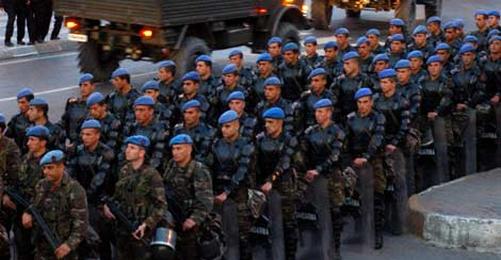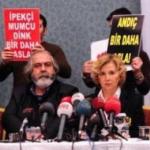The Protocol on Security, Public Order and Assistance Units (EMASYA), which provided soldiers with the possibility of intervention in civilian events, ceased to have effect.
In a press release to Anatolian Agency (AA) Minister of the Interior Beşir Atalay declared on 4 February that the protocol was abrogated with the signatures of General Staff Presidency Head of Operations Lieutenant General Mehmet Eröz and Interior Undersecretary Osman Güneş.
Atalay said that the decision was communicated to the General Staff Presidency and the governorships on 4 February. The Interior Minister indicated that the decision was preceded by a discussion on the matter with Chief of General Staff İlker Başbuğ.
"Authorization of governors"
Atalay informed AA that the Provincial Administration Law is sufficient and that the corresponding authority lies with the governors. He emphasized that the existing law is very detailed and thus the Ministry came to the conclusion that a new protocol or further determinations are not necessary. "We will apply the relevant provisions of the existing law", Atalay explained.
In an interview published by Hürriyet newspaper on 4 February Chief of General Staff Başbuğ agreed with Atalay: "The law is very clear; 'the governor is the superior of all general and special security forces'". Başbuğ added, " Military units will only intervene upon the request of the governor. We do not want to come up against the people in civilian incidents".
Prime Minister RecepTayyip Erdoğan said in a live broadcast on TRT on 31 January: "There is nothing like the EMASYA protocol and there will not be. We will take measures accordingly to close this issue".
The EMASYA Protocol
The Turkish Economic and Social Studies Foundation (TESEV) said the following about EMASYA in its 2009 report on "Security Sector in Turkey: Questions, Problems, Solutions":
The EMASYA protocol is one of the most typical examples for perceiving the protocol and its legislations superior to the law, for applications contrary to the law and for one of the privileged devices of the military tutelage system.
The interior security doctrine restructured after 28 February was build upon the EMASYA Protocol. The Protocol consists of 27 articles regarding the Provincial Administration Law (no. 5332) article 11/D and was worked out by the General Staff Presidency and the Ministry of the Interior on 7 July 1997. In cases deemed necessary, the protocol directs the intervention of military forces in situations of incidents regarding internal public order and security.
In accordance with the EMASYA Protocol, internal security operations and regional police task forces, village guards, gendarmerie internal security units and gendarmerie units conjoin with the highest ranking Land Forces Command (KKK) unit in the region upon the consent and approval of the governor. Police special operation task forces are subordinate to EMASYA Region and Subsector Commands; provisional village guards report to the regional Gendarmerie Command which again is subordinate to the EMASYA Command. Therefore, in terms of territorial issues the gendarmerie is not connected to the Ministry of the Interior but to the military authorities in such situations.
The "Public Order and Security Centres" established in each province garrison are made dependent on the military in terms of organizing the provincial police and civil chiefs of intelligence, assessment and planning. Due to this structure, the entire information gathered by civilian units and the intelligence can be obtained by the military. Again, the military can intervene in civilian incidents without permission of the civilian superior in situations deemed necessary. Thus, interior security is in fact provided by the military since provincial civilian structures are outranked by the armed forces.
According to the Protocol, internal security operations and the regional operation command are subordinate to the highest ranking military unit of the region. This unit is connected to the KKK in a large part of the country. In the south-eastern provinces of the country the operational status is not temporary but permanent, which means that public order is under control of the military in wide parts of the country.
One of the means to expand the Gendarmerie's jurisdiction is to deprive the governors of their duty in individual incidents or issues pending for more than one year which would normally be covered by the police forces. The previously mentioned article 10(c) of the Law on Gendarmerie Operation, Duties and Authority has been issued according to article 11/D of the Provincial Administration Law which is shaped by the EMASYA Protocol. At the same time, joint operations by the gendarmerie and police forces upon the permission of the civil superior and the directive of the prosecutor become increasingly common. This situation is highly compatible with the internal security doctrine of the military authorities and is indirectly relevant to the EMASYA Protocol. (TK/VK)












